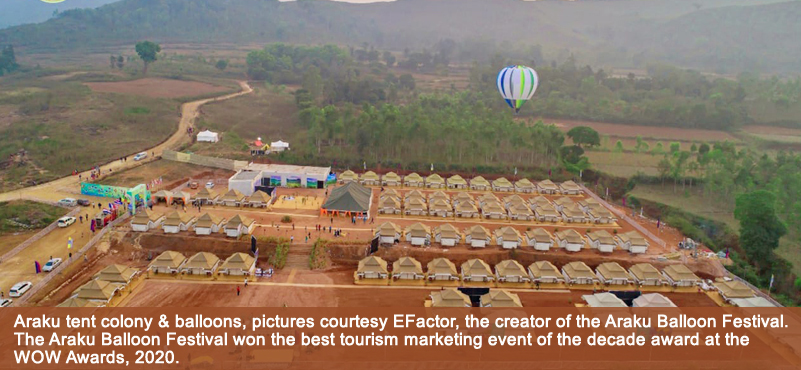Hotels and service providers would need to assimilate the ‘experience’ part in their offerings to a discerning traveller to remain relevant in a fast altering tourism market place, writes John Owen.
Experience the world within
Idyllic settings, pristine surroundings, gourmet cuisines, breath-taking views and oodles of pampering defined vacations, well, till recent times at least. “To travel is to live”
 goes the famous saying. And making this come true is the widely popular and growing concept of experiential travel that is making the traveller live as one with their surroundings. Experiential travel is redefining the travel norms and altering travel itineraries like never before. Away from the run of the mill and homely comforts, the new age traveller wants an experience that is unique, bespoke and a far cry from the tour packages on offer a plenty.
goes the famous saying. And making this come true is the widely popular and growing concept of experiential travel that is making the traveller live as one with their surroundings. Experiential travel is redefining the travel norms and altering travel itineraries like never before. Away from the run of the mill and homely comforts, the new age traveller wants an experience that is unique, bespoke and a far cry from the tour packages on offer a plenty.
It’s an experience that makes a person travel on a deeper and more personal level and to live through natural and spiritual highs in the arms of nature. The affinity towards discovering and connecting with the inner self is making travel brands offer more social travel experiences using technology and a wide spread global network of small operators. With our existing lives being governed by the clicks and the upload across the social media streams, the genre of experiential travel is trying to connect the dots and complete the experience matrix for the discerning traveller.
Industry estimates reveal that the travel market in the country is slated to cross the $40 billion mark by 2020. This growth will be in perfect unison with the exponential growth being experienced by the domestic travel industry that is seeing an upswing owing to the 700 million plus urban population that is forever on the lookout for different experiences. This growing demand as well as the intense competition in the hotel industry is making the players offer unique and different experiences that make them stand apart.
Change is Constant
Adopting and adapting change is the only way to flourish for travel brands targeting specific niches. A PEAK+SKIFT report on the rise of the experiential traveller states that the adventure travel market has grown 65 per cent yearly since 2009 according to last year’s Adventure Tourism Market Study, co-produced by George Washington University and the Adventure Travel Trade Association (ATTA).
The change is evident at both ends with both the travellers and the players exploring and offering more flexibility, technology integration and acceptance to soft adventures like snorkeling, volcano climbing, cooking with the local produce with the local chefs and experiencing the unconventional and unique stay accommodations including tree houses, home stays, light houses, caravans and luxury tents among others. This trend clearly indicates the preference towards journey and not the destination. Travelling is being seen as a way of unraveling and accepting alternative ways of life, learning more about the cultural evolution and ethos and even step out on a journey of self-discovery and evolution. Travel today has become seeking an emotional connect with the journey and the penultimate destination and not just get restricted to regular sightseeing and packaged tours.
Technology to the rescue
Internet is abuzz with a plethora of sites and operators popping up to offer an array of experiences to the growing traveller base with even various applications being introduced to plan the experience with the minutest of details being taken care off. These apps like Mobile Vacation Planner by Infogain, a tablet based app that helps to trip booking, empowers travel service providers to facilitate an interactive experiential mobile travel planning to their customers.
Apps like these enables travellers to access and explore rich travel content organized by geography. They can access things to see and do, read reviews, including ratings and recommendations written by other similar minded travellers to help them intelligently plan their next holiday or vacation.
It has become a need of the hour for travel technology and hospitality industry, especially the hotel brands to join hands to promote experiential travel for their future sustenance and remain relevant to travellers needs. And to be truly authentic, travel brands will have to don the hat of a local irrespective of the brands original presence and position and think of their presence in the context of their destination.
The growing acceptance and popularity of experiential travel has led to the rise of a number of sharing-based travel web platforms and apps, enabling tourists to engage with the locals. Airbnb, a global lodging platform, follows this model, connecting homeowners with travellers in search for accommodation options both in the private and shared space category. Catering to needs of all kinds of travellers, the choices offered by these web-based platforms are often affordable and flexible. These platforms also offer visitor infrastructure for upcoming destinations that are still to establish them on the tourists map.
The growing penetration of social media and mobile has become a popular method of planning and sharing trips with information, resources and recommendations being exchanged between travellers using these platforms. Along with sharing and promoting, the social media strategy is also proving successful in creating an interaction platform between brands and consumers. So explore, click and book the next experience that will make the ‘likes’ flow.




































